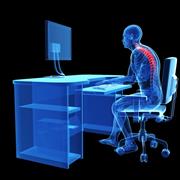Unlike our ancestors, who were active throughout the day, today more than half our waking life involves sedentary activities like watching television, working at a desk or commuting.
With the time we spend sitting every day, a sedentary lifestyle has become a growing concern. So much so that global studies show, on average, we sit for about 7.7 hours a day, while some results estimate people sit up to 15 hours a day. Research also suggests that sitting for more than three hours a day can cut two years off a person's life expectancy, even if they exercise regularly. Moreover, people with sitting jobs face twice the risk of cardiovascular diseases and slow metabolism.
Research also states that the average person's physical activity when not asleep results in 9.3 hours a day of sedentary work, 6.5 hours a day of low-intensity physical activity such as walking and standing, and 0.7 hours a day of medium-vigorous physical activity such as running or sports.
A detailed study (http://researchtheheadlines.org/2013/11/13/standing-desks/) reveals that as soon as you sit the electrical activity in the leg shuts down, calorie burning drops to one per minute and enzymes that help break down fat drop by 90%. Additionally, good cholesterol drops by 20% after 2 hours of sitting whereas insulin effectiveness drops by 24% after 24 hours, raising the risk of diabetes.

What does science say about the health hazards of sitting?
Prolonged sitting has been linked to high blood pressure and elevated cholesterol. When we sit or remain inactive for long, muscles burn less fat and blood flows sluggishly, which leads to heart diseases. Chronic sitters who don't extend their hip flexors for more than 3 minutes a day face a decrease in hip mobility.
Sitting for long periods has also been linked to a number of health concerns, including cancer, obesity and metabolic syndrome - a cluster of conditions that includes increased blood pressure, high blood sugar, excess body fat around the waist and abnormal cholesterol levels.
On the other hand, regular physical activity improves mood, controls weight and boosts energy. Here are a few tips that will help you stay active daily and cut down the risk of health problems:
1. If you work long hours at a desk, try a standing desk or improvise with a high table
2. Stretch every half hour and take a 3-5 minute walk every hour
3. Stand up or walk back and forth when you talk on the phone
4. Place small pedal machines under your desks to exercise your legs
5. Avoid sitting while commuting by the bus, subway or train
6. Avoid using a remote and walk up to the TV to manually change the channel or adjust the volume
7. Try distinctive yoga poses to improve the extension and flexion movements in your back
8. Swap some TV time for more active tasks such as jogging, dancing or weight lifting
9. Take the stairs instead of elevators
Although sitting is inevitable in our lives, we can certainly make changes to the amount of time we sit. With the growing rate of health diseases, it is always safe to take precautionary measures like investing in health insurance. So sit less, stand more and start now!